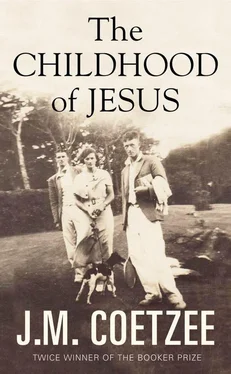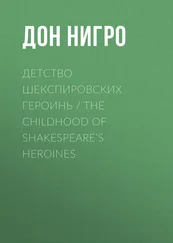And what is he up to, anyway, with Elena, a woman he barely knows, the mother of the child’s new friend? Is he hoping to seduce her, because in memories that are not entirely lost to him seducing one another is something that men and women do? Is he insisting on the primacy of the personal (desire, love) over the universal (goodwill, benevolence)? And why is he continually asking himself questions instead of just living, like everyone else? Is it all part of a far too tardy transition from the old and comfortable (the personal) to the new and unsettling (the universal)? Is the round of self-interrogation nothing but a phase in the growth of each new arrival, a phase that people like Álvaro and Ana and Elena have by now successfully passed through? If so, how much longer before he will emerge as a new, perfected man?
‘You were telling me about goodwill the other day, goodwill as a universal balm for our ills,’ he says to Elena. ‘But don’t you sometimes find yourself missing plain old physical contact?’
They are in the parklands, beside a field on which half a dozen disorderly football games are being played. Fidel and David have been allowed to join in one of the games, though they are really too young. Dutifully they surge back and forth with the other players, but the ball is never passed to them.
‘Anyone who brings up a child does not lack for physical contact,’ replies Elena.
‘By physical contact I mean something different. I mean loving and being loved. I mean sleeping with someone every night. Don’t you miss that?’
‘Do I miss it? I am not the kind of person who suffers from memories, Simón. What you speak of seems very far away. And — if by sleeping with someone you mean sex — quite strange too. A strange thing to be preoccupied with.’
‘But surely there is nothing like sex for bringing people closer. Sex would bring the two of us closer. For example.’
Elena turns away. ‘Fidelito!’ she calls, and waves. ‘Come! We have to leave now!’
Is he mistaken, or is there a flush on her cheek?
The truth is, he finds Elena only mildly attractive. He does not like her boniness, her strong jaw and prominent front teeth. But he is a man, she is a woman, and the children’s friendship keeps drawing them together. So, despite one polite brush-off after another, he continues to permit himself mild freedoms, freedoms that seem to amuse more than anger her. Willy-nilly he finds himself slipping into daydreams in which some or other stroke of fortune impels Elena into his arms.
That stroke of fortune, when it comes, takes the guise of a power cut. Power cuts are not infrequent across the city. Usually they are announced a day in advance, and apply either to even-numbered or to odd-numbered dwellings. In the case of the Blocks, they are applied to whole buildings according to a rota.
On the evening in question, however, there is no announcement, just Fidel knocking at the door, asking whether he can come in and do his homework, since there is no electric light in their apartment.
‘Have you eaten yet?’ he asks the boy.
Fidel shakes his head.
‘Run back at once,’ he says. ‘Tell your mother that you and she are invited to supper.’
The supper he provides for them is no more than bread and soup (barley and squash boiled up with a can of beans; he has yet to find a shop that sells spices), but it is adequate. Fidel’s homework is soon done. The boys settle down with picture books; then suddenly, as if poleaxed, Fidel falls asleep.
‘He has been like that since he was a baby,’ says Elena. ‘Nothing will wake him. I’ll carry him back and put him to bed. Thank you for the meal.’
‘You can’t go back to that dark apartment. Stay the night. Fidel can share David’s bed. I’ll sleep in a chair. I am used to it.’
It is a lie, he is not used to sleeping in chairs, and on the little straight-backed kitchen chair he doubts that sleep is humanly possible. But he gives Elena no chance to refuse. ‘You know where the bathroom is. Here is a towel.’
By the time he himself returns from the bathroom she is in his bed and the two boys are asleep side by side. He wraps himself in the spare blanket and switches off the light.
For a while there is silence. Then, out of the dark, she speaks: ‘If you are uncomfortable, as I am sure you are, I can make space.’
He slips into bed with her. Quietly, discreetly, they do the business of sex, mindful of the children asleep an arm’s length away.
It is not what he had hoped it would be. Her heart is not in it, he feels that at once; as for himself, the reserve of pent-up desire that he had counted on proves to be an illusion.
‘You see what I mean?’ she whispers when it is over. With a finger she brushes his lips. ‘It doesn’t advance us, does it?’
Is she right? Should he take this experience to heart and bid farewell to sex, as Elena appears to have done? Perhaps. Yet merely to hold a woman in his arms, even if she is no ship-stirring beauty, buoys him.
‘I don’t agree,’ he murmurs back. ‘In fact, I think you are quite wrong.’ He pauses. ‘Have you ever asked yourself whether the price we pay for this new life, the price of forgetting, may not be too high?’
She does not reply, but rearranges her underwear and turns away from him.
Though they do not live together, he likes to think of himself and Elena, after that first shared night, as a couple, or a couple in the making, and therefore of the two boys as brothers or stepbrothers. It becomes more and more of a habit for the four of them to have their evening meal together; at weekends they go shopping or go on picnics or excursions into the countryside; and though he and Elena do not spend another whole night together, she now and again, when the boys are out of the way, allows him to make love to her. He begins to grow used to her body, with its jutting hipbones and tiny breasts. She has little sexual feeling for him, that is clear; but he likes to think of his lovemaking as a patient and prolonged act of resuscitation, of bringing back to life a female body that for all practical purposes has died.
When she invites him to make love to her, it is without the slightest coquetry. ‘If you like, we can do it now,’ she will say, and close the door and take off her clothes.
Such matter-of-factness might once have put him off, just as her unresponsiveness might once have humiliated him. But he decides he will neither be put off nor humiliated. What she offers he will accept, as readily and as gratefully as he can.
Usually she refers to the act simply as doing it , but sometimes, when she wants to tease him, she uses the word descongelar , thaw: ‘If you like, you can have another go at thawing me.’ It was a word he once let slip in a heedless moment: ‘Let me thaw you!’ The notion of being thawed back into life struck her then and strikes her now as limitlessly funny.
Between the two of them there is growing up, if not intimacy, then a friendship that he feels to be quite solid, quite reliable. Whether friendship would have grown up between them anyway, on the ground of the children’s friendship and of the many hours they spend together, whether doing it has contributed anything at all, he cannot say.
Is this, he asks himself, how families come into being, here in this new world: founded on friendship rather than on love? It is not a condition he is familiar with, being mere friends with a woman. But he can see its benefits. He can even, cautiously, enjoy it.
‘Tell me about Fidel’s father,’ he asks Elena.
‘I don’t remember much about him.’
‘But he must have had a father.’
‘Of course.’
Читать дальше












